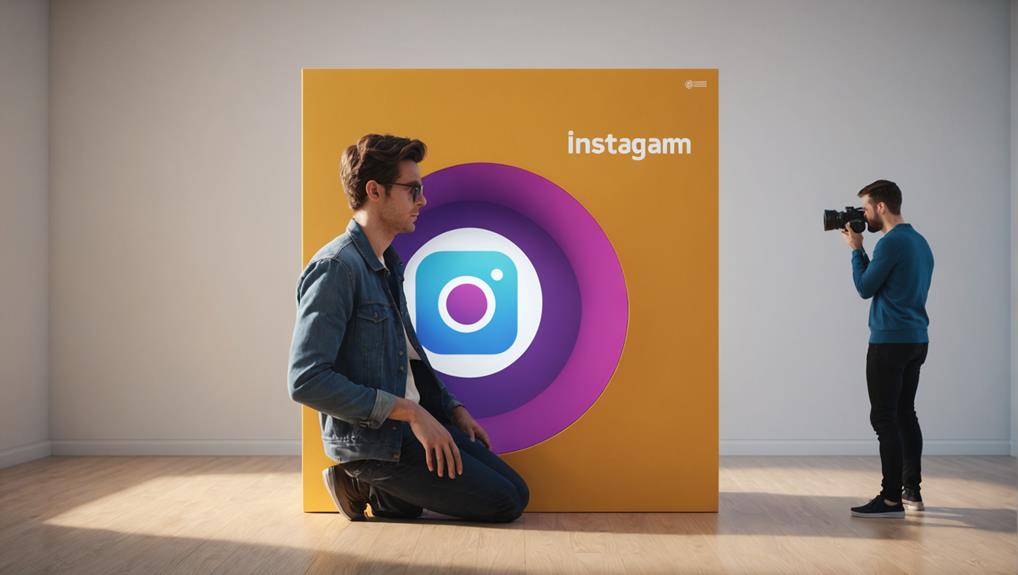
When you decide to archive someone on social media, they won't know about it, as they don't get any notifications. This feature helps you manage what's visible on your profile without permanently deleting memories, and keeps your actions private. Whether it's a Facebook post or an Instagram photo, archiving it simply removes it from public view without alerting anyone, allowing you to maintain a curated online presence and relationships. This makes archiving a discreet tool for digital interaction. You might find that exploring more about how social platforms handle archiving could answer many of your other privacy-related questions.
Understanding Archiving

Archiving a post hides it from your main profile without deleting it, allowing you to manage your digital presence more discreetly. You're not alone in wanting to curate what others see and maintain a space that truly reflects who you are at this moment. It's like keeping a diary under lock and key; not everything in your past needs to be on display for everyone.
When you choose to archive a post, it's only visible to you. This feature ensures that you can revisit memories without permanently erasing them. It's a way to protect your feelings and the feelings of others, without the drama of deleting posts. Remember, social media is a mosaic of moments, but not every piece has to be public.
Archiving is particularly useful when you're going through transitions. Whether you're nurturing new relationships, stepping into a new job, or simply shifting your perspectives, it helps to manage what you share. This control can make you feel more secure and integrated into your social circles, knowing you have the power to shape how you're perceived. It's your narrative, after all, and you should tell it as you see fit.
Archiving Vs. Blocking
While archiving lets you quietly manage what's visible, blocking someone on social media completely cuts off their access to your posts. You might find yourself in a situation where you're not ready to sever connections entirely but need a break from certain interactions. Archiving is your go-to here—it's like tucking away those old school photos in a drawer. You know, the ones where you're not quite sure why you kept them, but you're not ready to throw them out either.
Blocking, on the other hand, is a much stronger step. It's like changing the locks. They won't see your updates, can't interact with you, and vice versa. It's a full stop, creating a definitive boundary. This might be necessary when you're looking to protect your peace or need to remove someone who disrupts the sense of community and safety you've fostered online.
Privacy Implications

Considering the privacy implications, you should be aware that archiving does not notify the other person but subtly changes how you interact with their content. This feature essentially lets you customize your social media environment without creating a rift in your relationships. You're not severing ties; you're simply tidying up your digital space. It's like silently managing who sits at your virtual table without causing a scene.
This discreet control over your online interactions supports a sense of belonging. You're able to shape your social landscape in a way that aligns with your emotional needs and boundaries. By archiving rather than blocking, you maintain connections on your terms, fostering a healthier digital environment. You're not ostracizing anyone but are protecting your mental space from potential stressors.
User Notifications Explained
You won't receive a notification when someone archives your content. This might leave you wondering if you're still part of the community or if you've somehow been left out. However, it's crucial to understand that this feature is designed to respect privacy and maintain a seamless interaction, not to create a divide. Everyone's digital space is their own to manage, and the lack of notifications is there to prevent any unnecessary tension or discomfort that might arise from being explicitly informed about such actions.
It's like silently tidying up a room without needing to announce every detail. This discretion fosters a sense of trust and respect among users, ensuring everyone feels secure and valued, no matter the changes that occur behind the scenes. So, while you might not know when your content is moved to an archive, you can rest easy knowing that your presence in the community isn't defined by these hidden actions. You're still a vital part of the group, archive or no archive. Remember, the connections you form and the interactions you engage in are what truly matter.
Archiving on Instagram

Let's explore how archiving works on Instagram, focusing on its impact on your digital footprint. Archiving is like hiding a photo or video from your feed without deleting it. You're the only one who can see your archived posts, keeping your page clean without losing memories.
When you archive a post, it disappears from your profile grid and stories archive, but doesn't notify anyone. It's as if you're tidying up your digital space, ensuring that what's visible aligns with how you want to present yourself now. This feature is particularly handy when your feelings about a post change, or it no longer fits the 'vibe' you're going for. You're in control, and you can unarchive anytime to bring posts back into the light.
Consider archiving as creating a private collection of moments that matter to you. It's your personal gallery, away from the public eye, where you're free to reflect, reminisce, and even reshape your online persona. This tool empowers you to curate your social media presence thoughtfully, making sure it's a true reflection of who you are and how you belong in your community.
Archiving on Facebook
Shifting to Facebook, archiving works similarly by allowing you to hide posts from your timeline without deleting them permanently. You know those moments you cherish but aren't quite ready to share with everyone? Maybe it's a personal victory or a quiet memory with a close friend—archiving lets you keep these moments to yourself until you're ready to bring them back into the spotlight.
Archiving on Facebook is like having a private box where you can place these memories. It's a space just for you, away from the public eye, where you can revisit them whenever you want without anyone else knowing they're tucked away. This feature is especially handy when your online persona needs a bit of tidying up or when past posts no longer align with who you are today.
Managing Online Relationships

While archiving can help tidy your digital footprint, effectively managing online relationships requires careful consideration of how and when to engage with others on social media. It's crucial to remember that each interaction you have contributes to the ongoing narrative of your virtual presence and impacts how you're perceived by your network.
You're part of a community, and your actions should foster a sense of inclusion and respect. This means thinking about the timing and content of your posts and comments. Ask yourself if what you're sharing will add value or potentially alienate someone. It's about finding a balance where you can express yourself authentically without stepping on others' toes.
Be proactive in your communications. If you haven't heard from someone in a while, reaching out can make a big difference. A simple message asking how they're doing can rekindle a connection and show that you care. Also, be responsive. If someone comments on your post or sends you a message, acknowledging them promptly shows that you value their input and presence in your digital life.
Above all, stay true to yourself while being considerate of the community you're a part of. Your online relationships are real relationships, and they thrive on mutual respect and understanding.
Conclusion
You've now got the scoop on archiving versus blocking and their privacy implications. Remember, archiving on platforms like Instagram and Facebook lets you tidy up your feed without notifying others. So, manage your online relationships wisely. Whether you choose to archive or block, it's all about maintaining your digital space the way it suits you best. Keep these tips in mind to navigate your social media with confidence and discretion.






